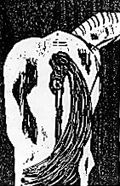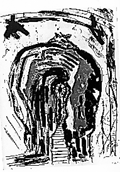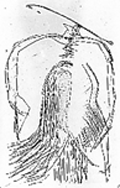

When Hans is elaborating a fantasy of how the stork came to deliver Hanna
- a fantasy which by now we know he does not believe but through the manipulation
of which he is mocking his father's attempts to enlighten" him about
matters of which he already knows more than he can communicate - he says
that the stork came to the door and rang the door-bell. His father, surprised,
asks how the stork did it and Hans says he did it with his beak; his father
asks whether he shut the door again and Hans, in a mood clearly difficult
for us now to discern because of our lack of hearing, says that a maid shut
it for him. As a final example, which also bears upon the unherard of the
text, Freud near the end mentions how he entertained a suspicion that Hans's
repressed wish might now be that he wanted at all costs to see his mother's
widdler. As his behaviour to a new maid fitted in with his hypothesis...".
Maids, governesses, ghosts; those people who fill a house but whose word
is presumed untrustworthy, those who play no part in the "hearing"
of a case, those who are supposed to have no hearing at all except for what
they are permitted to hear; we are here clearly in the world of The Turn
of the Screw, but we can go farther than that by wondering about selectivity
of evidence, about the paralysing fear of hearsay" which conditions
this restriction to family positions, which sets up this carapace over a
set of experiences which clearly, on Little Hans's part, were richer and
more various than could be heard. And here in particular we are at last
in realm of experience of the female, even if unheard; and we can now turn
to look at it more closely, and particularly at Hans's mother. For it is
around the silent, unheard figure of Hans's mother that the key contradictions
of the text operate and it is also, as I shall attempt to show, around the
figure of the mother that the desire of the text, Freud's desire, the desire
of analysis, coagulates. I want to deal with the mother here under two headings,
first, in terms of Legends of Love and Beauty; second, in terms of Legends
of Fear and the Mother of Separation.
Legends of Love and Beauty; and as I talk through this I want you to recall
to mind, to re-hear, the passage I read out earlier on. Let me remind you
of one or two elements in it. "Hereditary taint"; "beautiful
mother"; "of some assistance to her". To take the middle
one of these first: throughout the test when Freud refers to Hans's mother
he refers to her as the beautiful mother". Sometimes he goes further;
there is a reference to her as "Hans's excellent and devoted mother".
He says, in the context of a remark of hers about pigs to which we shall
return, that she must be excused such comments because she had a predestined
part to play,and her position was a hard one". There is a fantasy of
all virtue, and this can hardly be unconnected with the fact, of which he
apprises us, that he has in the past been of some assistance to her".
She is, then , the healed product of his own analytic practice, and thus
she is necessarily beautiful, excellent and devoted; we may go further and
say that in this text Freud betrays every sign of love for her. This leaves
the hereditary taint"; what may we hear in this rueful comment? We
must turn here to anextraordinary sentence of Freud's which occurs when
he reports on the one session he actually spent with Hans and, of course,
his father, when, Freud assures us, he said to Hans the following:
Long before he was in the world ... I had known that a little Hans would come who would be so fond of his mother that he would be bound to feel afraid of his father befause of it; and I had told his father this.On the surface, this is presumably Freud's way of explaining the Oedipus complex to a four-year-old; but we may enquire further, especially in the light of the previous comment that Hans's mother's position was a hard one". There is a reference here to a "primal" event, to Freud himself as Hans's fantasised precursor, indeed his progenitor; this in itself might solve the reference to the hereditary taint", for there is no doubt that insofar as Freud considers anybody in the legend to be married to the beautiful, silent, suffering mother, it is he himself; he must suffer the guilt - or pass it onto Hans - and it is clear too that he considers himself to be the incarnation of Hans's unnamed, acolyte, unmanned father; what we have here is the fantasised record of a love affair. But this love, this tension in silence between the hearing professor and the unheard patient, is by no means without its vicissitudes, and the text betrays many of them in its ceaseless attempts to inscribe meanings on the mother's body, to hear a voice which makes itself through the text and through the masculist collusion which forms the peculiar birth scenario of Little Hans as a textual object.

Legends of Fear; the Mother of Separation.
For Freud's love for Hans's mother is struggling against some very real
alternatives, real blockages .- it is in this text, you may remember, that
he refers to the clitoris as permanently stunted". We have already
seen that, according to the textual account, it is Hans's mother who threatens
to send him to Dr A- back to the beginning? back inside the fearsome womb?
- to have his penis cut off. It is also Hans's mother, further to unravel
a clue I have already mentioned, who, when Hans asks her why she will not
touch his penis, responds helpfully with the comment Because that'd be piggish".
It is not clear to me to what aspect of the behaviour of pigs this remark
refers. Hans's Mother it also is who, when little Hans announces that he
wants to sleep with an older femaler child rather than in the company of
his parents, says, "Well, if you really want to go away from Daddy
and Mummy, then take your coat and knickers and - good-bye!" What is
this sort of evidence? What are we hearing here? What are we to hear when,
twice, Hans tells his father that his mother beats his baby sister,and his
father receives this information without turning a hair? What are we to
think when his father says, with an apparently matter-of-fact air, that
his mother frequently threatens to attack Hans with a carpet-beater?
Nineteenth-century practices; a refraction of an age-old history of abuse;
patriarchal mysteries; violence and silence interlocked, violosilence, ancient
twins of nightmare and enclosure. All that, certainly; but particularly
here in the text, it seems to me, a knot at the root of analysis; and, perhaps,
of discourse. For we have love and hate here, certainly, inscribed as on
the psychopath's knuckles; we have a long-suppressed love on Freud's part
for his past patient, and unhandled transference trying to seep out in the
constant references to little" Hans,to the complex childing undergone
throughout the text by its many patients"; but also here we have, I
think,the figure of the Mother-of-Separation. The Mother-of-Separation (perhaps
myth has known her as Kali or Artemis) is an analytic concept which perhaps
needs some explanation. The situation is thus. The primal mother, the mother
of undifferentiation, the mother of promise and fullness, offers everything.
We are prone to fall into the Lacanian trap and say that Daddy comes along
and spoils all that (Freud falls into that trap too; so does Hans's father).
But this is to underestimate the richness of the child's world, in which
fullness is already entwined with emtptying, kenosis. The Mother-of-Separation
is always there; there in the moment of the withheld breast, there in the
moment of inattention - there indefatigably, of course, at the moments surrounding
the birth of a baby, and a baby sister at that; she is the mother who is
not available and thus she serves as the figure within which all unavailability
is collected, the withheld female who attracts all blame and punishment,
one way of looking at the orgin of rape fantasies.
But Mother-of-Separation also there within the analytic session, it is she
who hears,she whom you can hear but you cannot touch. She sits just behind
you,. out of sight, and she whispers back to you your dark thoughts. She
is permanently unavailable; her promises to soak up the energy of the transference
are hollow; her hollowness is the hollow voice of the grave; in this incarnation
she is not the brazen, flashing artemis but black hekate, goddess of household
garbage and rats. She calls you a pig, and you are a pig; she wields the
knife and you put up with it because you know - or think - that she has
another face, another set of hands, to embrace, to coax", as little
Hans expressed his thoughts about the caress. It does not matter in this
context whether the analyst male or female; transference to a wished-for-mother
will still proceed, and the culmination of those unleashed feelings will
still be thwarted; or, of course, sometimes not, if we ar to believe the
accounts of abuse of therapeutic process which are now current in the media.
Mother-of-Separation: a presiding deity of this text, I would say, and the
block against which Freud constantly stubbed his toe, here recapitulating
an insuffiency in no way palliated by the long years since he was of assistance
to" Hans's beautiful mother - in bed, perhaps, or at least in the guise
of midwife. I would remind you that we are talking of the realm of fantasy
here; or of the undecidable line which blocks off the truth"of history,
the truth of the case. But we must move on (as Hans could not); and also
we must leave the scene. And there is so much more to say. More to say about
the nature of the case", for example; for the case, if we look at it
etymologically, betrays its own contradiction. It is that which proves but
that which disproves. All existing laws founder on the special case; no
number of cases amounts to anything other than case law. What is the case?
How can we construct an anomic series of events - for events are apathetic
beyond all control- into a case" which will speak with a single interpretable
voice? And is it only on that basis that we can conduct a hearing",
legal or otherwise? Is this where our hearing becomes engaged, in the demonstration
of the normal, or in the bringing to attention of the atypical? Was this
the dynamic for Hans's father, the search for a case" which would interest
the hearing professor, which would unconsciously shift the paternity of
his problematic child, which would mock all responsibility through the web
of the Mother-of-Separation?
Truth and explanation are at stake here in many forms, but emblematised,
in Little Hans's rejection of all false interpretation, in his inventive
reappropriation of the lies he is told about the stork. Who is on trial"
here,who is to get a hearing; I want to conclude with some speculations
on hearing, psychoanalysis, criticism. First, I have used before in there
sessions, and thus in the context of Foreign Body, the notion of a refugee
reading". Itr is becoming clearer to me what I mean by that. For the
refugee cannot hear. The refugee is stuck, fleeing, amid the gabble of unintelligible
voices: scrabbling, perhaps, for some news of home, news which she or he
know from the outset will be a distortion, will perhaps "suffer from
a hereditary taint"- I don't kown whether any of you saw on television
this week the two ambassadors who have recently defected from the Iraqi
diplomatic corps, but surely there we had two refugee voices, voices whose
modulations related to impossible worlds, worlds in which one could remember
the dream which, precisely and as at the end of this text of Freud's, one
has forgotten.
The refugee hears only from a distance, through the web of the Mother-of-Separation;
the promise of fullness has been emblematically withdrawn; we are here in
the world of overhearing, which we know also as the alienation oft the romantic
poets, as the distant echoes of the oft-told tale of the Ancient Mariner.

Little Hans had to cope with these distancing problems too; and if Mother-of-Separation
is really Hekate' s earthly represents a more total death than Hades, she
stands for humiliation and obliteration, the stuff of very early fantasies,the
being eaten up and having our bones thrown on the rubbish heap, extinction
without the succour of Hades's crucial voice, a realm where there is nothing
more to hear, where there is no more here". This, as I have said elsewhere,.
is the gift of analysis, it deals in the remains because it takes its strength
from the dark background, which is death, and thus it is that all Freud's
recapitulatory moves necessarily end in contradiction. Little Hans is death-bound,
and knows it; in the darkness around the horse's mouth he sees, not for
God's sake only his father's moustache but the darkness of all destination
, a destination which precedes articulacy; and thus it is that he prefers
not to move, he prefers to alien animation of his own phobia (or perhaps
he is the phobia's own possession, for possession is an emblematic trope
here) for he senses that overloading is the substance of which psyche is
made, that he will soon be embarked on the black coach with its terrible
freight - the best realisation of this is one of the earliest fantasies
in Ian Banks's The Bridge, which is also in toto a fantasy about the problem
of movement, as Freud says in this text that all of our motive phobias will
eventually cathect onto the railway. God help British Rail, and we see now
why Sir Bob Reid, offered an honorary doctorate at Stirling university last
year, declined saying that he preferred to wait until his place of work
was no longer a public embarrassment.
I seem to have got distracted. This is probably right, because when we are
thinking about hearing we are automatically thinking also about tuning (my
father was a radio operator) and we are tuned to different spans. In analysis
there is the analytic hour, which lasts 50 minutes, no more and no les.
Shall I transgress it? Of course I shall -I already have. It is only to
posit a few questions. One is the obvious one in terms of the location of
analytic practice: are we dealing in recollection or in a new dealing of
the cards, are we hearing ancestral voices prophesying war or the rumbling
of our own hungry refugee bellies, memory or desire? An other is, what of
the symptom, what of the fact that while trying to prepare this presentation,
and having a poisened foot, I inevitably stubbed my toe on the door of my
own office, thus conclusively preventing myslelf from moving? The last (perhaps)
is about real refugees, about those who surround us on all sides, about
those who are disenfranchised at birth, about real foreign bodies.
And so a double parting gesture. First: if you really want to know something
about the foreign body, about its fragments and dismemberments, I recommend
that you read alongside the legend of little Hans an entirely different
text, a text by a south african called Bloke Modisane, called Blame Me on
History, which has a different way of conjuring the primal scene; but second,
of course, because even in the line of flight, as Deleuze and Guattari call
it, of the scapegoat or, as I prefer to call it, the refugee, there still
must be points of recognitions, border controls, thus my effort at securing
the presence of the next stage of this presentation is to ask you to let
me hear something else about this curious case, a case which calls all possession,
all naming, all signification into question; although I have deliberately
allowed it to be named in my title as the case of Freuds Little Hans.
out...